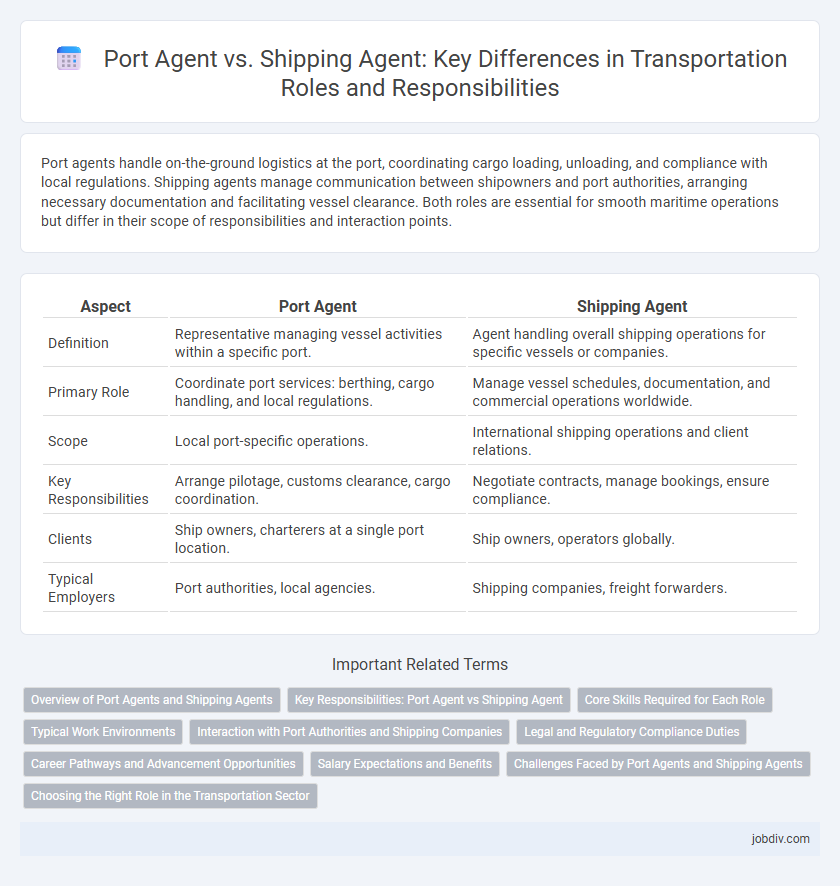Port agents handle on-the-ground logistics at the port, coordinating cargo loading, unloading, and compliance with local regulations. Shipping agents manage communication between shipowners and port authorities, arranging necessary documentation and facilitating vessel clearance. Both roles are essential for smooth maritime operations but differ in their scope of responsibilities and interaction points.
Table of Comparison
| Aspect | Port Agent | Shipping Agent |
|---|---|---|
| Definition | Representative managing vessel activities within a specific port. | Agent handling overall shipping operations for specific vessels or companies. |
| Primary Role | Coordinate port services: berthing, cargo handling, and local regulations. | Manage vessel schedules, documentation, and commercial operations worldwide. |
| Scope | Local port-specific operations. | International shipping operations and client relations. |
| Key Responsibilities | Arrange pilotage, customs clearance, cargo coordination. | Negotiate contracts, manage bookings, ensure compliance. |
| Clients | Ship owners, charterers at a single port location. | Ship owners, operators globally. |
| Typical Employers | Port authorities, local agencies. | Shipping companies, freight forwarders. |
Overview of Port Agents and Shipping Agents
Port agents coordinate vessel operations at specific ports, managing activities such as berthing, cargo handling, and local regulations to ensure smooth port calls. Shipping agents represent the shipowner or operator globally, handling broader responsibilities including documentation, crew changes, and communication across multiple ports. Both roles are crucial in maritime logistics, with port agents focusing on on-site coordination and shipping agents providing comprehensive operational support throughout the voyage.
Key Responsibilities: Port Agent vs Shipping Agent
Port agents primarily manage vessel-related tasks within the port, coordinating activities such as crew changes, arranging for pilotage, securing berth assignments, and handling customs documentation to ensure smooth port operations. Shipping agents oversee broader responsibilities including cargo documentation, freight bookings, liaising with ship owners, and managing communication between the ship and cargo interests to facilitate efficient shipping logistics. Both roles are essential for seamless maritime transport, with port agents focusing on local port operations and shipping agents handling overall vessel and cargo administration.
Core Skills Required for Each Role
Port agents require strong knowledge of port operations, local regulations, and effective communication skills to coordinate between vessels, terminal operators, and customs authorities. Shipping agents must excel in logistics management, documentation accuracy, and customer service to handle cargo booking, freight forwarding, and ensure timely vessel clearance. Both roles demand proficiency in problem-solving and industry-specific software, but port agents focus more on on-site coordination while shipping agents emphasize administrative and commercial processes.
Typical Work Environments
Port agents typically operate within port terminals, managing vessel arrivals, cargo handling, and coordinating with port authorities to ensure efficient turnaround times. Shipping agents primarily work in shipping company offices or combined logistics centers, handling documentation, customs clearance, and liaising with charterers and ship owners. Both roles require close interaction with maritime professionals and regulatory bodies to facilitate smooth maritime operations.
Interaction with Port Authorities and Shipping Companies
Port agents act as the primary liaison between shipping companies and port authorities, ensuring compliance with local regulations and facilitating vessel services such as berthing, pilotage, and customs clearance. Shipping agents coordinate directly with shipping companies to manage the operational aspects of cargo handling, documentation, and crew changes, while also maintaining communication with port authorities to streamline port operations. Their interaction with both entities optimizes vessel turnaround time and enhances overall port efficiency.
Legal and Regulatory Compliance Duties
Port agents ensure vessels comply with local port regulations, customs laws, and environmental standards, acting as the legal liaison between shipowners and port authorities. Shipping agents manage contracts, freight documentation, and adherence to international maritime laws like SOLAS and MARPOL, ensuring full regulatory compliance throughout cargo handling. Both roles require thorough knowledge of national and international legal frameworks to prevent penalties and operational delays.
Career Pathways and Advancement Opportunities
Port agents specialize in managing vessel operations and coordinating port services, offering career advancement through roles like port operations manager or terminal superintendent. Shipping agents focus on cargo logistics, documentation, and compliance, with pathways leading to positions such as freight forwarding manager or shipping operations director. Both career tracks benefit from certifications in maritime law and logistics, enhancing prospects for senior management and international assignments.
Salary Expectations and Benefits
Port agents typically earn an average annual salary ranging from $50,000 to $70,000, with benefits including performance bonuses, health insurance, and travel allowances. Shipping agents may have a broader salary spectrum between $45,000 and $80,000, often supplemented by commission-based incentives, retirement plans, and flexible work schedules. Both roles provide opportunities for career advancement, but shipping agents generally have higher earning potential due to their involvement in global logistics coordination.
Challenges Faced by Port Agents and Shipping Agents
Port agents face challenges such as coordinating vessel schedules, managing customs documentation, and ensuring compliance with port regulations, which require extensive local knowledge and real-time communication. Shipping agents encounter difficulties in handling cargo documentation, navigating international shipping laws, and resolving discrepancies in freight bookings, impacting overall supply chain efficiency. Both roles demand precise coordination to mitigate delays, reduce operational costs, and maintain smooth maritime logistics operations.
Choosing the Right Role in the Transportation Sector
Selecting between a port agent and a shipping agent depends on the specific operational needs within the transportation sector. A port agent primarily manages the local affairs of a vessel while berthed, including coordinating with port authorities and arranging supplies, whereas a shipping agent oversees broader logistics such as documentation, customs clearance, and cargo handling across multiple ports. Choosing the right role requires assessing whether the focus is on on-site port services or comprehensive voyage management to ensure efficient maritime transport operations.
Port Agent vs Shipping Agent Infographic

 jobdiv.com
jobdiv.com